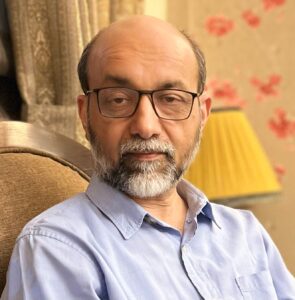June 5, 2025, marked a significant milestone for emergency physicians across Pakistan and the surrounding region — the inaugural C-HALO (Collaborative Hubs of Academic Learning Organization) webinar on Major Trauma was successfully conducted. This event was the culmination of years of dedication by national and international faculty working to establish a collaborative platform for academic advancement in Emergency Medicine (EM).
C-HALO began as an ambitious vision around 2018, born out of the need for structured collaboration among institutions and individuals passionate about advancing EM in the region. The journey wasn’t easy for them as early efforts were met with skepticism, especially given the relatively small number of formally trained EM physicians compared to the large, traditionally staffed emergency departments across the country. But through persistent advocacy and commitment, C-HALO gradually gained momentum and structure.
Starting from the combined work of national and international doctors of Emergency Medicine creating a great document, different academic tracks were developed under C-HALO, and the first webinar was planned around one of the most pressing themes in emergency care: Major Trauma. Esteemed speakers from across the globe participated, bringing diverse perspectives and rich experience to the table. The event attracted a broad audience, particularly from Pakistan and neighboring SAARC countries, further emphasizing the spirit of regional collaboration.
Webinar Highlights
Below is a brief summary of the key sessions and insights from the webinar:
- Triage in Emergency Departments and also in Trauma Settings
Speakers of the webinar stressed the foundational importance of effective triage in managing all emergencies and also trauma. Triage allows emergency teams to quickly identify and prioritize the most critical patients, ensuring efficient use of limited resources. Well-documented triage practices also serve as evidence of workload and burden of disease — crucial when advocating for support and resources from hospital leadership and policymakers. An effective triage is the best insurance for the safety and quality of patient care, also ensuring safety of the doctors and nurses treating the patients. - Towards a National Triage System
Building on the triage discussion, there was a discussion about a standardized national triage system. Such a system should be grounded in international best practices, while being sensitive to local contexts and realities. A unified triage protocol would improve coordination, consistency, and quality of care across different emergency departments nationwide. - Trauma Care, Competence, and Situational Awareness
Trauma care is more than clinical expertise — it is about human interaction during crisis, and responding with empathy and situational awareness. The session highlighted the psychological and emotional dimensions of trauma care, urging EM professionals to develop not just technical proficiency but also strong interpersonal and emotional intelligence skills when dealing with patients and their families. - A Lesson in Change
The history of Emergency Medicine in Pakistan is one of ongoing struggle and unwavering resolve. Progress may have been slower than hoped, but the lesson shared was clear: persistence works. Individual and collective efforts have already resulted in meaningful change, with improved emergency care systems and greater awareness of the specialty’s value, especially in trauma care. This gives a hope to continue this trajectory and create a better system in Pakistan for the Emergency Care. - Trauma Care and Integrated Response Systems
Competence in trauma care is essential, but collaboration is key. Speakers emphasized the importance of a coordinated trauma network — one that begins care at the point of injury, continues through a skilled emergency response, and ensures timely transfer to appropriate facilities. Such integrated systems are critical for delivering safe, effective trauma care at a national level. - Point of care Ultrasound saves lives and energy.
There was a great presentation about the use of POCUS (Point of Care Ultrasound) and its use in Emergency Medicine especially trauma care. The convenience of being reproducible, and can be done at the bedside was the main point. Also the expertise required to do it, are not very difficult, and we all agree that the more we practice the POCUS the better we become.
Conclusion
The C-HALO webinar on Major Trauma was a resounding success. Bringing together expert voices from various regions and institutions, it laid a strong foundation for future academic and clinical collaboration. The inclusion of participants from across the SAARC region was particularly meaningful, underscoring the value of shared learning in facing common challenges.
The C-HALO team deserves high praise for their commitment and execution. This event not only set the tone for future academic activities but also served as a powerful reminder of what persistent, collaborative effort can achieve in establishing Emergency Medicine as a recognized and respected specialty in Pakistan.
